| Rye %: | 100% |
| Stages: | Sponge, Soaker, Final dough |
| Leaven: | Rye sour culture, Instant yeast |
| Start to Finish: | 22-28 hours |
| Hands-on Time: | 30-40 minutes |
| Yield: | One 3 lb./1.36 kg loaf |
For a bread that many Germans consider to be a best of breed Lower Saxony rye, recipes for Oldenburg Rye are surprisingly scarce; in fact, it took me several months, plus the help of a German baking friend, to locate this recipe on the website of a large north German baking ingredients company.
The search was worth the hassle: this is a bread that combines the robust flavors and mouth-feel of coarse rye meal with the moist crumb of a stale-bread soaker and the intense sour of an 18-24 hour sponge.
The sponge ripens at 85°F/30°C – the sweet spot for yeast and lactobacillus activity. And although the coarse rye meal sponge shows little expansion, its powerful acid aroma attests to the microbial activity. Fine rye meal in the final dough, plus a 20-minute mix, produce the starchy gel that gives the bread its structure and a small addition of instant yeast boosts the leavening opower of the sponge to create an open crumb that’s unusual in a 100% rye bread.
If you like food with strong flavors, as I do, this is a bread that will stand up to them, from robust veined cheeses to smoked and cured meat and fish, as well as savory soups and stews. I’ll be baking this Oldenburg Rye again … and again.
Sponge:
| Ingredient | Grams | Ounces | Baker’s Percentage |
| Coarse rye meal | 415 | 14.65 | 100% |
| Warm (105°F/41°C) water | 415 | 14.65 | 100% |
| Rye sour culture | 40 | 1.40 | 10% |
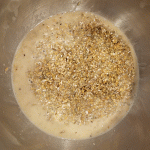 Combine the sponge ingredients in the mixer bowl, cover and ferment at 85°F/30°C 18-24 hours.
Combine the sponge ingredients in the mixer bowl, cover and ferment at 85°F/30°C 18-24 hours.
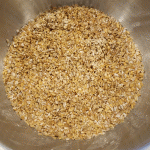 The sponge will have absorbed all the water and have a strongly acidic smell, but will not have significantly expanded. To reach the specified ripening temperature, set the sponge in a cold oven with the light on or preheat the oven to 100°F/38°C and then turn it off, repeating every few hours.
The sponge will have absorbed all the water and have a strongly acidic smell, but will not have significantly expanded. To reach the specified ripening temperature, set the sponge in a cold oven with the light on or preheat the oven to 100°F/38°C and then turn it off, repeating every few hours.
Soaker:
| Ingredient | Grams | Ounces | Baker’s Percentage |
| Stale rye bread | 85 | 3.00 | 100% |
| Warm (105°F/41°C) water | 170 | 6.00 | 200% |
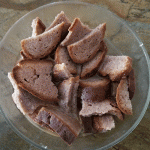 In a separate bowl combine the soaker ingredients and let stand, covered, for at least 3 hours.
In a separate bowl combine the soaker ingredients and let stand, covered, for at least 3 hours.
Final Dough:
| Ingredient | Grams | Ounces |
| Soaker | 255 | 9.00 |
| Sponge | 870 | 30.70 |
| Fine rye meal | 289 | 10.25 |
| Warm (105°F/41°C) water | 165 | 5.85 |
| Salt | 18 | 0.65 |
| Instant yeast | 2 | 0.05 |
| Sugar beet molasses, light cane molasses or dark corn syrup | 8 | 0.30 |
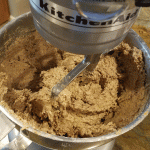 Mash the soaker and combine it with the final dough ingredients. Use the paddle at low (KA2) speed to mix, scraping down the bowl as necessary, until the coarse rye meal has broken down, 20-25 minutes.
Mash the soaker and combine it with the final dough ingredients. Use the paddle at low (KA2) speed to mix, scraping down the bowl as necessary, until the coarse rye meal has broken down, 20-25 minutes.
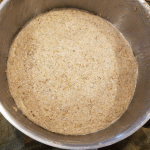 Cover the mixing bowl and ferment at 85°F/30°C until the dough has doubled in volume, about 1 hour.
Cover the mixing bowl and ferment at 85°F/30°C until the dough has doubled in volume, about 1 hour.
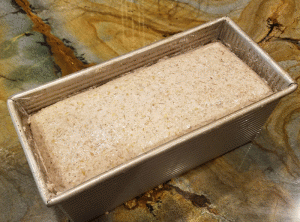 Use a plastic scraper and wet hands to transfer the dough into a well-greased 9″x4″x4″/23x10x10 cm. Pullman loaf pan or 9″x5″x3″/23x13x8 cm standard loaf pan. Use hands and scraper to pack the dough, which will be soft and very sticky, evenly in the pan and smooth the top. Cover and proof at room temperature (70°F/21°C) until the dough reaches the lip of the pan, about 1 hour.
Use a plastic scraper and wet hands to transfer the dough into a well-greased 9″x4″x4″/23x10x10 cm. Pullman loaf pan or 9″x5″x3″/23x13x8 cm standard loaf pan. Use hands and scraper to pack the dough, which will be soft and very sticky, evenly in the pan and smooth the top. Cover and proof at room temperature (70°F/21°C) until the dough reaches the lip of the pan, about 1 hour.
Preheat the oven to 480°F/250°C with the baking surface in the middle and a steam pan on a lower shelf. Brush the loaf with water and use a docking wheel, fork or chopstick to dock the surface thoroughly and evenly to a depth of at least ¼”/0.6 cm. Bake with steam 10 minutes, then remove the steam pan, reduce the temperature to 390°F/200°C and bake until the internal temperature is at least 198°F/92°C, 40-50 minutes. Transfer to a rack and let rest 24-48 hours before slicing.
Baker’s Percentages:
| Ingredient | g | % |
| TOTAL FLOUR | 704 | 100.00% |
| Coarse rye meal | 415 | 58.95% |
| Fine rye meal | 289 | 41.05% |
| Water | 580 | 82.45% |
| Salt | 18 | 2.59% |
| Instant yeast | 2 | 0.24% |
| Rye sour culture | 40 | 5.68% |
| Soaker water | 170 | 24.15% |
| Stale bread | 85 | 12.07% |
| Syrup | 8 | 1.18% |
| TOTAL FORMULA | 1,608 | 228.35% |
| % prefermented | 415 | 58.95% |

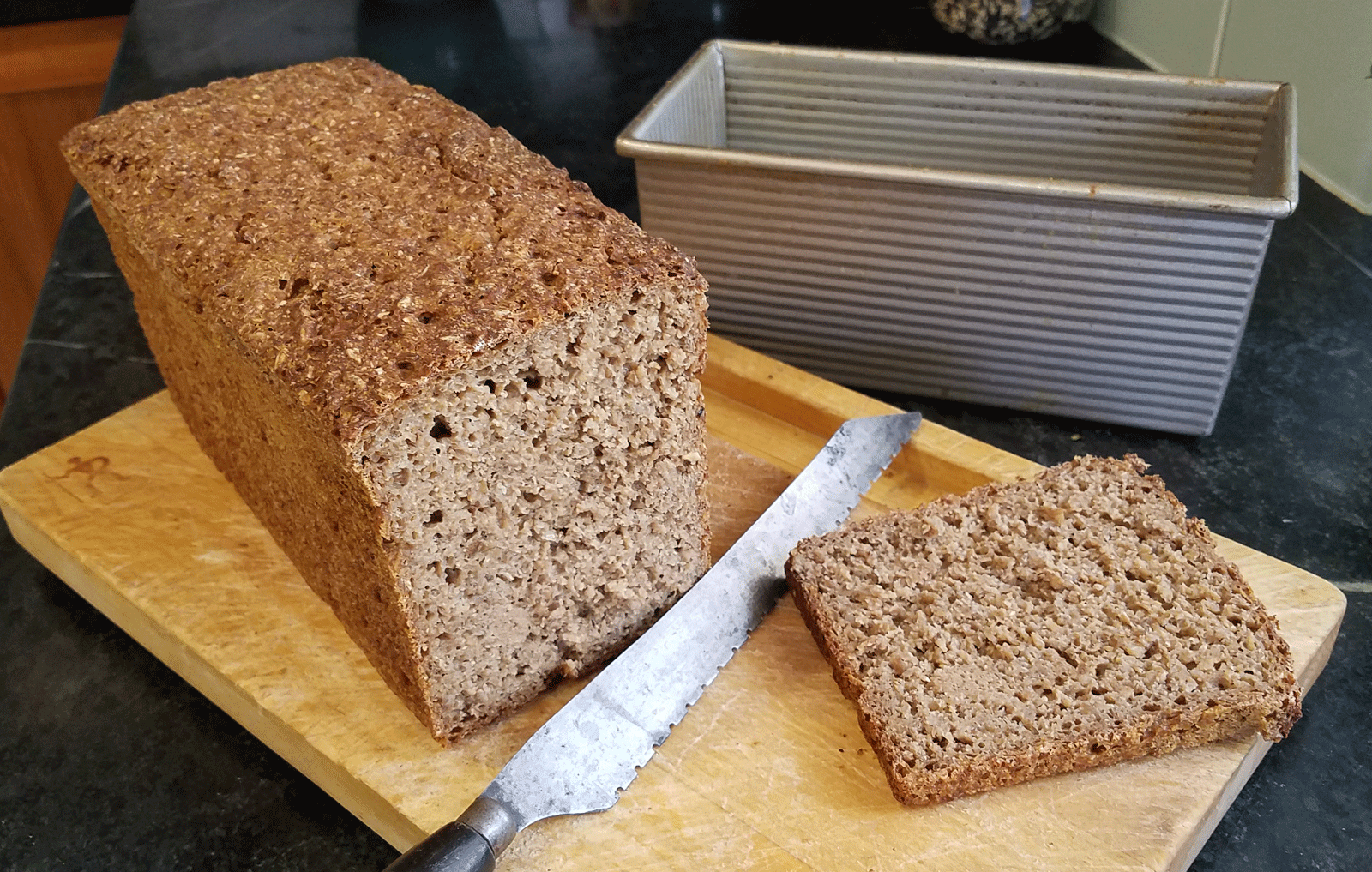

Tortoise
June 22, 2017Hi Stanley,
This looks like one fabulous rye that I will have to try. One question- how long did your loaf take to complete the final proof before going into the oven? I’m trying to plan my baking timeline for this weekend.
Thanks,
Tortoise
Stanley Ginsberg
June 22, 2017Sorry about that. It proofed at room temperature for about 1 hour. I’ve added that info to the recipe. Thanks for your feedback.
Tortoise
July 10, 2017Hi Stan,
I finally managed to bake this loaf and I must say that the flavour is outstanding. It has a complex rye flavour with a nice sour kick from the large percentage of rye sour. I also used pieces of leftover Franconia Rye for the soaker which added even more complexity. My crumb was a tiny bit on the gummy side even after a 2 day rest. I think that the next time I bake this I will shorten the final proof a few minutes as well as bake it a few minutes longer.
I will definitely be adding this loaf to my regular rye rotation. Thank you for digging up the formula!
Tortoise
JSR
July 17, 2017where do you get the fine and coarse rye meal? is that something i can mill myself?
Stanley Ginsberg
July 17, 2017You can mill it yourself or buy it online from http://www.nybakers.com (my business).
Tortoise
July 17, 2017JSR,
I mill my own using a Komo Classic stone mill for the fine and I use the Kitchenaid grain mill attachment on the most coarse setting for the coarse rye meal and it works beautifully. I’ve made the Oldenburg twice now. It is a delicious loaf with a nice sour bite from the large percentage of sour. Do give it a try.
JSR
July 18, 2017what’s the difference between a whole grain rye flour and a rye meal? would you say that a fine rye meal is pretty similar to a retail whole grain rye flour?
Jay
June 18, 2018This recipe is great! Love the moisture of the crumb and the sourness. I used old black bread, whole rye flour instead of meal and took out the syrup. I might try a rye scald in place of syrup on the next batch